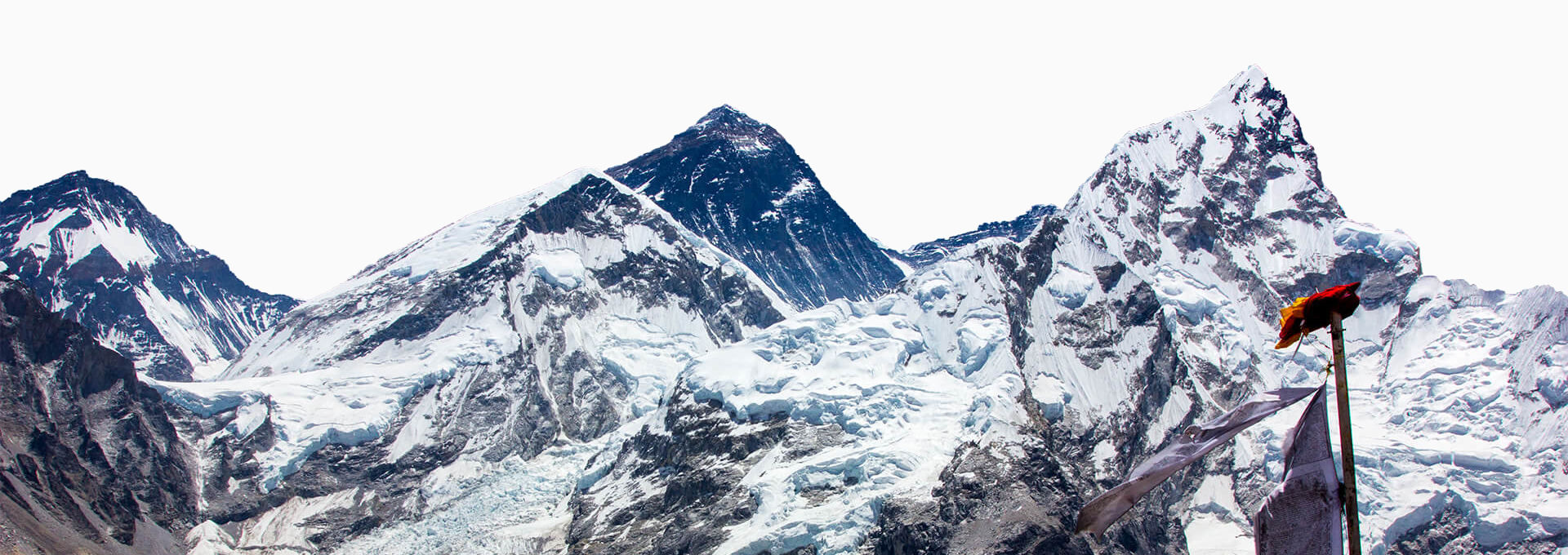
Everest Base Camp trek is hands down the most well-developed trek in Nepal. And the hoteliers have left no stones unturned to make sure that trekkers have all the choice in the world when it comes to food and drinks.
Drinking-Water in Everest Base Camp Trek
An exit poll at Kathmandu’s International Airport showed that 68% of people suffered from some form of diarrhoea. Here are some ways to make sure you don’t become one of them:
- Bottled water– Although convenient, they are not tested for quality and are not environmentally friendly. Also, since January 2020, the local government of Khumbu has banned plastic bottles in the Everest Region. So be a hero and Bring Your Own Bottles. Just make sure it can take hot water.
- Boiled water– It is the safest and most convenient option. Most lodges serve it, and it is great to ward off the cold. Prices range anywhere between NPR 50 and 120 per cup, and NPR 300 and NPR 1200 for a large pot (in Gorakshep). Cold untreated tap water is free and not recommended.
- SteriPEN– This easy and effective solution kills 99.9% of bacteria, virus and protozoa using UV technology and can hence turn tap water into drinking water easily. Make sure to read the directions carefully and use the pen for the required duration.
- Purification tablets– Water purification tablets or chemicals like chlorine dioxide are other commonly used. They are easy to carry and inexpensive to buy. However, they are not as effective as UV filters or boiled water and need a few hours to act.
Besides these, LifeStraw and iodine-based treatments are also available but have their drawbacks. Read more about Water Safety in Nepal and Diarrhoea here.
Cost of Food in Everest Base Camp Trek

During your Everest Base Camp Trek, food is something you don’t have to compromise on at all. There are a variety of options from typical Nepali dal-bhat, soups, snacks, momos, fried rice, to Chinese and continental dishes like noodles, spaghetti, spring rolls, and steak.
The prices of food go higher with the increasing altitude (which is a no brainer) as everything has to be transported via porters, mules, yaks, or helicopter, after having been flown in to Lukla from Kathmandu. Surprisingly, the options in the menu are not limited even in the highest point of the trek, Gorakshep. You can compare the menu of a hotel in Lukla (the starting point of the trek) with a hotel in Lobuche (the second last point in the trek) below.
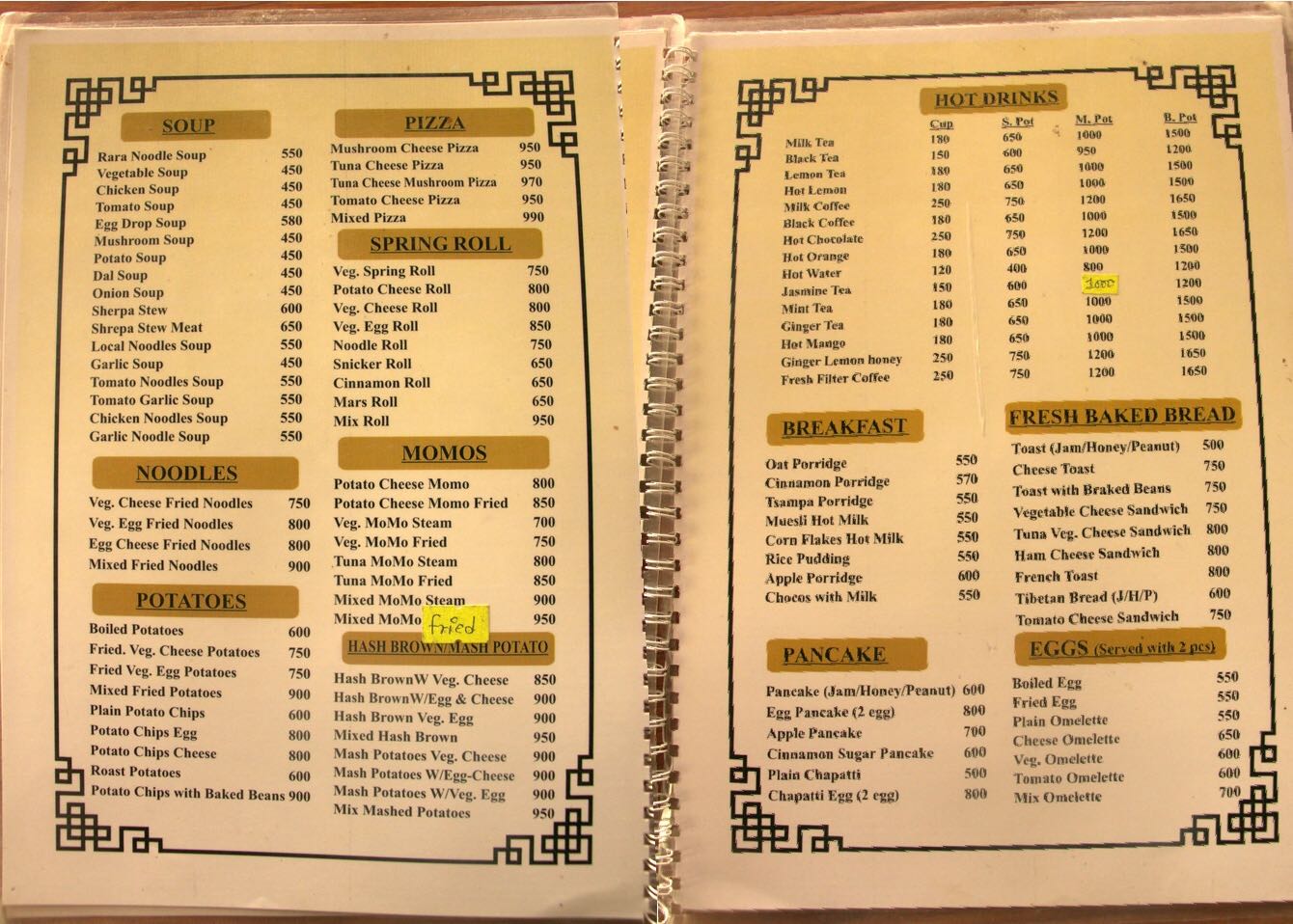
You can estimate an average of USD 25-30 per day for food and drinks. This will include a light breakfast, decent lunch, dinner with soup, hot drinks and water. Prices can go down by a few dollars if you are conservative. And another thing to note is that the menu prices don’t change with the change in seasons.
If you want to eat outside the lodges, Lukla and Namche Bazaar have several restaurants, including bakeries, pizza places, steak and burger places. You will also find some bakeries at Tengboche, Dingboche, Pheriche, and Lobuche.
Snacks available in the Everest Base Camp Trek
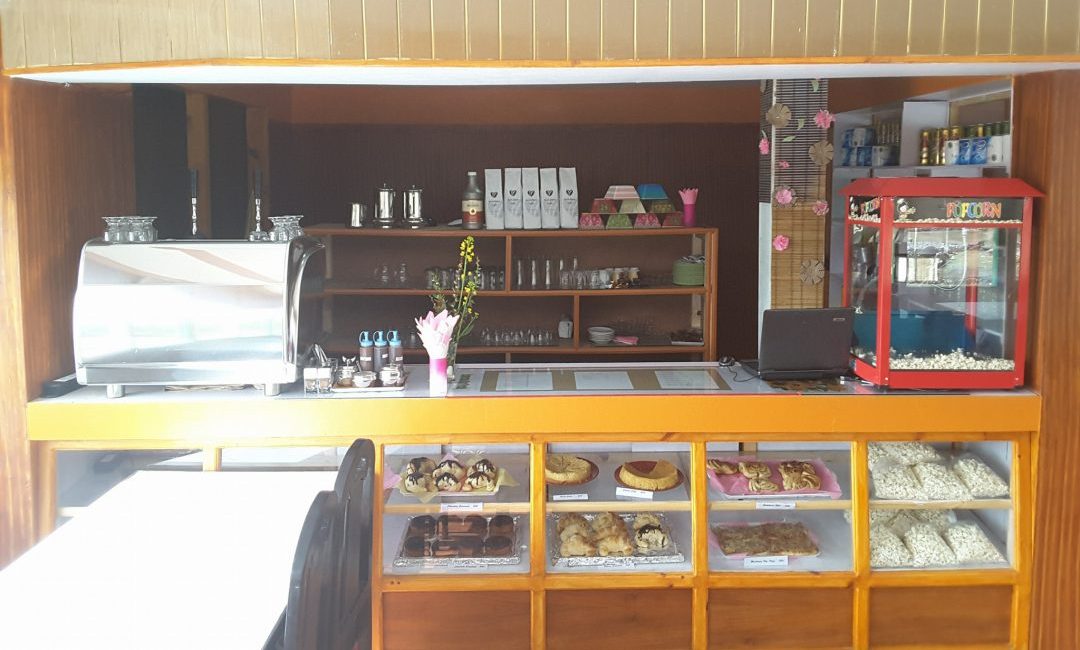
Most of the tea houses along the trails in Everest Base Camp Trek sell biscuits, candies, and Pringles. Besides, there are small convenient stores in Lukla, Phakding, Namche Bazaar, Pangboche, Dingboche, and Pheriche with a lot more options like Granola Bars, Dry fruits, Candies and Coke.
If you’re worried about whether or not you should bring snacks from your home country, given the weight of your backpack, you can consider buying them in Kathmandu or directly in Lukla. The rates are way less in Kathmandu than Lukla, and the prices increase with the altitude.
Vegan Diet on the Everest Base Camp Trek
If you are a vegan, please rest assured that you will easily survive the Everest Base Camp Trek. With the increasing number of vegans, hotels and restaurants (in Lukla and Namche Bazaar) have vegan options for trekkers.
For breakfast, popular options include Chapati, Oat porridge, fried, or mashed potato. Lunch and dinner have a bunch of options. ‘Dal Bhat,’ the staple food for Nepalese, that comes with cooked rice, boiled lentils, vegetable curries, and pickles, can be your best friend during the trails. It is filling, healthy, and tastes great. Besides, there are nutritious soups of all kinds, fried rice, veg noodles (soup and fried), potatoes, veg momos, veg pasta with tomato sauce, etc.
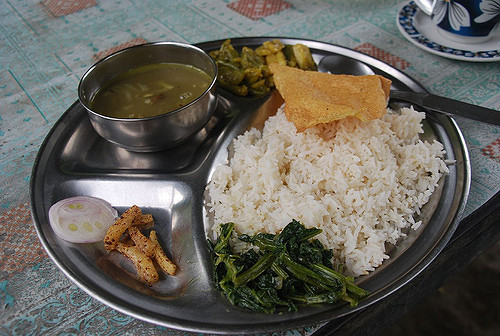
If you want to try Sherpa food in the Everest Base Camp Trek, you can go for Tsampa or Tibetan Bread for breakfast and Veg Shakpa (Sherpa Stew), Veg Thukpa (noodle soup), Riki Kur (potato pancakes), Tmomo and Rildhuk (soup with potato lumps).
Tips: Always ask hotel staff to make the dish on the menu by excluding dairy and meat, and they can cook it for you. As for snacks, you can bring them from your country as the options may be limited in Nepal.
You can read more about Vegan trekking in Nepal here.
Should you eat Meat along the Everest Trek?
We highly recommend trekkers not to eat meat during the Everest Base Camp Trek. Sherpa culture forbids killing or slaughtering of animals in the Khumbu Region which means that the meat is either brought from Kathmandu or villages below Lukla. And needless to say the meat is transported on the back of porters or mules for several days, unrefrigerated.
Bringing your Own Food / Cooking you Own Meals
Practically, there’s no need at all. Everest Base Camp Trek is the most comfortable trek with tea houses throughout the trails. Only a few groups still camp.
Besides, it is the policy of hotels that trekkers must eat at the hotel itself. If anyone wants otherwise, hotels will charge them around USD 15-20 for the same rooms instead of USD 5. This rule applies of course only for breakfast and dinners.
However, in some extreme conditions, like if you are on a restricted diet or have health issues, you can explain your situation to the hotels. Lodges might upcharge you but they will allow you to cook your own meal. Even so, you can buy beverages and hot water in the hotels so nobody is upset.
Altitude Sickness and Food
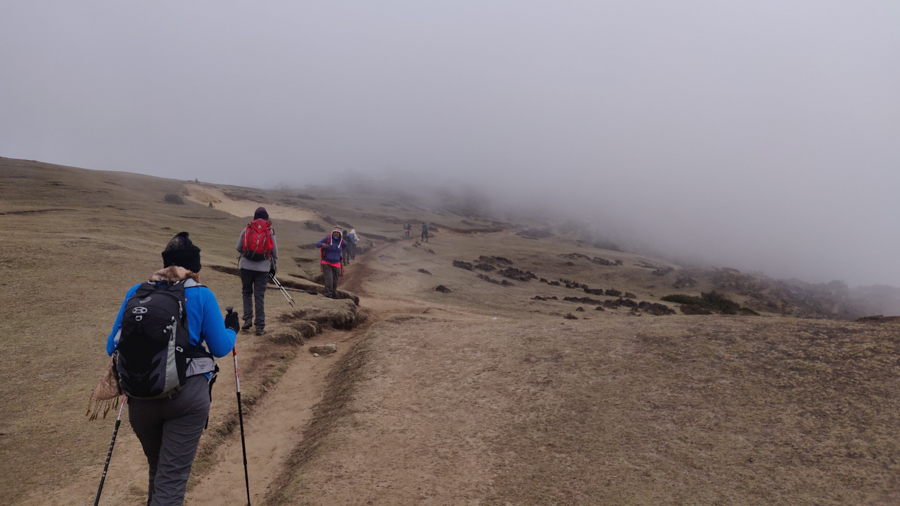
Food and beverages also contribute to better performance in the high altitudes. Here are a few things you should keep in mind.
- Eat more Carbs– Carbohydrates require less oxygen for metabolism, prevent low blood sugar levels in the blood, and reduce fatigue. So, you should eat rich in high carbohydrates like energy bars, oatmeal, rice, pasta, sports drinks, whole wheat food, dry fruits, and nuts.
- Drinks for hydration– One gets dehydrated quickly in higher altitudes, which can further increase fatigue and invites the risk of frostbite and altitude sickness. So there’s no substitute for staying hydrated by drinking 4 liters of fluid every day. If you don’t like drinking water all the time, mixing ORS or drinking other warm drinks like soup, juice, tea work fine too.
- Garlic soup: While there isn’t any research to support it, garlic soup is the Sherpa remedy against Altitude Sickness. If nothing, garlic soup has hot water and essential salts, two things that are good for acclimatization!
- Beetroot and other Nitrate rich food: These have been shown to help with acclimatization and in case you have a choice to
- Avoid alcohol and caffeine-Both alcohol and caffeine can cause dehydration which is a risk factor for Altitude Illnesses. Hence, it is good to avoid both on your way up.
Beer and other beverages
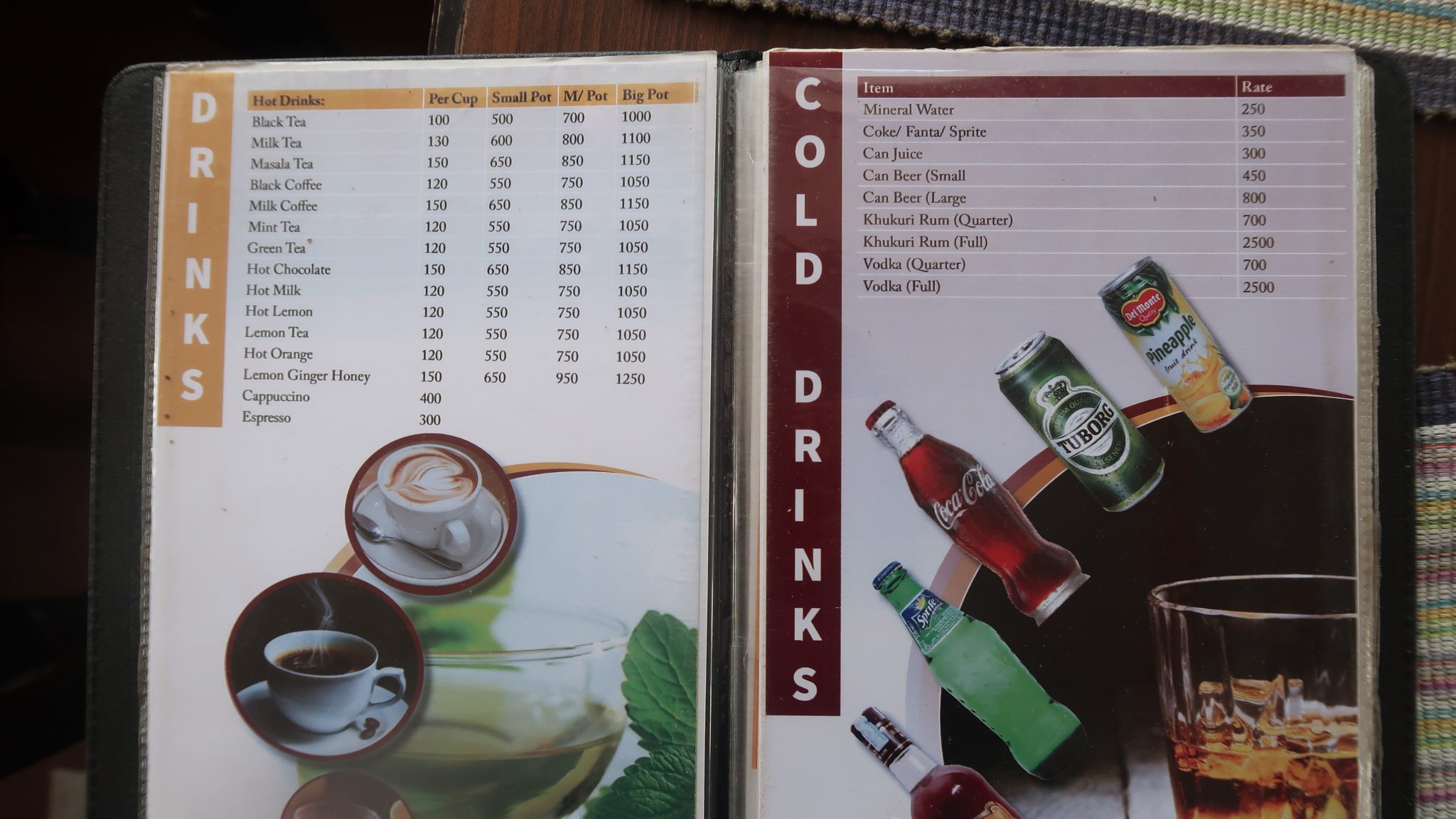
When it comes to beverages, hotels offer a wide choice of tea, hot lemon, hot juice, coffee, hot chocolate, and milk. The prices generally range from NPR 100 – NPR 300 (increasing with the altitude).
Selected hotels in the trails up to Dingboche also have coffee machines to serve Cappuccino, Americano, and Cafe Latte. The price ranges from NPR 250 – NPR 400.
Alcoholic beverages of all kinds are an absolute no-no for the trails. However, you can go for it after the completion of your trek. There are many beer bars and pubs in Namche Bazaar and Lukla.
Cost of Can beer (650 ml) in Namche Bazaar- NPR 700 – NPR 1000
Besides, when in Solukhumbu, you can also try the local Chaang (rice beer) or raksi. The local hooch places (bhattis) in Namche Bazaar, Phakding, and Lukla sell them.
Please note however, that both alcohol and caffeine can dehydrate the body and hence slow down acclimatization. Hence, if you don’t want to get Altitude Sickness, it is a good idea to limit these drinks when you are returning.






